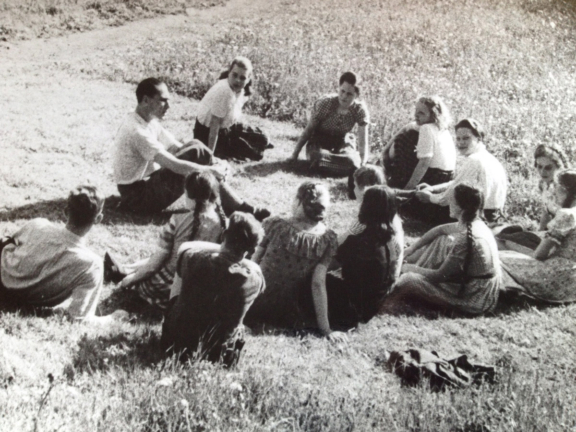
Madalena Perdigão: interdisciplinarity and pedagogy
With Ana Marques Gastão, Maria Emília Brederode Santos, João Fiadeiro and Patrícia Portela, moderated by Ana Bigotte Vieira
Event Slider
Date
- / Cancelled / Sold out
Location
Auditorium 3 Calouste Gulbenkian FoundationBearing in mind Madalena Perdigão’s substantive work, two generations of pedagogues discuss their experiences of education and teaching, seeking to understand them in the long term to better question the present. Thus, on the one hand, the artists Patrícia Portela and João Fiadeiro, both Madalena Perdigão/ACARTE prize-winners, share the challenges still posed by their interdisciplinary approach today, while, on the other hand, Maria Emília Brederode Santos and Ana Marques Gastão examine some of the educational experiments pursued by Madalena Perdigão, who they both knew well.
As part of the celebrations of the centenary of Madalena Perdigão’s birth, this talk takes place after the screening of the film Révolution École 1918-1939 by Joanna Grudzinska, which shows a relationship between pedagogy, interdisciplinarity, sensitive education and peace, serving as a motto for a look into art and education in Portugal in the second half of the 20th century.
Image: Geraldo Jordão Pereira, Madalena Perdigão and Guimarães Rosa, Rio de Janeiro, 1966 © DR
Ana Marques Gastão (1962, Lisbon) is a poet, fiction writer, essayist and researcher. With a Law degree, she was a cultural journalist and dance critic, and has been the coordinator of the magazine Colóquio-Letras since 2009. She attended the Calouste Gulbenkian Foundation's art education and ballet courses from the outset. She is a member of CLEPUL at UL and a consultant for the Ana Hatherly Chair at UCLA, Berkeley. Among her many published works, A Mulher sem Pálpebras (2021) has won the SPA Prize for best narrative fiction.
Maria Emília Brederode Santos (1942, Lisbon) studied and taught at the Institut de Psychologie et des Sciences de l’Éducation in Geneva. She completed a master's degree at Boston University with the thesis "Education for Democracy: a Developmental Approach to Teacher Education." She worked in teacher training at the Faculty of Sciences of the University of Lisbon and collaborated in the establishment of the School of Education in Setúbal. She served as President of the National Council of Education between 2017 and 2022. She was awarded the Order of Public Instruction in 2004 and received an Honorary Doctorate from ISPA.
Patrícia Portela (1974, Lisbon) is a writer and programmer. She served as the artistic director of Teatro Viriato in Viseu. She holds a degree in stage art from the Lisbon Theatre and Film School (ESTC) and completed a master's degree in European scenography at Central Saint Martins College of Arts in London, in partnership with the Utrecht Faculty of Theatre. Additionally, she obtained a master's degree in Philosophy from the Institute of Philosophy in Leuven. She was the founder and a member of the artistic direction of the Prado Cultural Association, in collaboration with Isabel Garcez and Helena Serra, and a founding member of the collective O resto.
João Fiadeiro (1965, Paris) belongs to the New Portuguese Dance generation. In 1990 he founded Companhia RE.AL, the organization which produces his creations, and directed Atelier Real between 2004 and 2019. He systematized Real-Time Composition, a theoretical and practical tool that leads him to teach nationally and internationally. He is a PhD candidate at the University of Coimbra's College of Arts and an Associate Artist at Fórum Dança.
Ana Bigotte Vieira (1980, Lisbon) is Co-IR of the FCT Archiving Theatre project and an integrated researcher at the Institute of Contemporary History. She has published Uma Curadoria da Falta, about the ACARTE service of the Calouste Gulbenkian Foundation in 1984-1989, based on her doctoral research. Between 2018 and 2023 she was part of the curating team at Teatro do Bairro Alto. Together with João dos Santos Martins, she started the project For a Timeline to Be – genealogies of dance as an artistic practice in Portugal, of which dance not dance – archaeologies of new dance in Portugal is the 7th edition.
dance not dance
This event is included in the (re)performances, films and talks series which constitutes the first part of dance not dance – archaeologies of the new dance in Portugal. More info.
The Calouste Gulbenkian Foundation reserves the right to collect and keep records of images, sounds and voice for the diffusion and preservation of the memory of its cultural and artistic activity. For further information, please contact us through the Information Request form.

